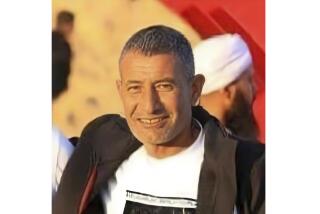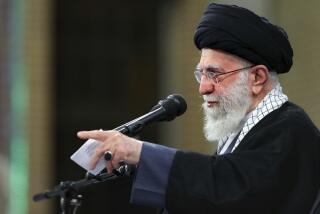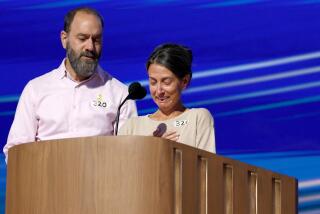Hopes Raised for Hostage Release : Mideast: U.S. officials say they have assurances that an American will be freed soon. The Lebanese kidnapers say they will send an envoy to the United Nations.
The Islamic Jihad kidnapers of two Americans, igniting a spark of hope that an end to the Beirut hostage drama might be near, pledged in a cryptic message Tuesday that they would dispatch a special envoy to the United Nations secretary general with “an extremely important message.”
In Washington, the news evoked a strange mood of wariness and optimism. Senior U.S. officials said privately that the Bush Administration had been informed by the Iranian government through diplomatic intermediaries that the release of an American hostage is imminent. But when speaking publicly, virtually everyone in the Administration, including President Bush, expressed far less optimism.
U.N. Secretary General Javier Perez de Cuellar said in New York that he had received no overture for a meeting with any special envoy. But he added: “I hope that what I am hearing is the beginning of a solution to this tremendous problem of the hostages and the beginning, as well, of a small success for all those, including myself, who have been trying to solve the problem.”
The message, a 13-line, typewritten statement in Arabic from the Shiite Muslim terrorist group calling itself Islamic Jihad, was delivered to an international news agency in Beirut and accompanied by a photograph of Terry A. Anderson, who has been held captive for more than six years, longer than any other foreign hostage in Lebanon.
The pro-Iranian Islamic Jihad also claims to hold a second American, 60-year-old Thomas Sutherland, who was acting dean of agriculture at the American University of Beirut when he was kidnaped June 9, 1985.
In the message, Islamic Jihad said it was sending the envoy to Perez de Cuellar within the next 48 hours “in view of our belief in the importance of working to solve the problems of our strugglers who are held in the world and especially occupied Palestine and the problem of those detained with us and to solve the problems of all their families.”
Bush, on the eve of a four-week vacation in Kennebunkport, Me., was circumspect about the news.
“Hopes get raised over and over again,” he told reporters. “I’m just saying all this public attention to it . . . comes in cycles, it seems to me . . . and I do not want to make any statement of any kind that would contribute to the concern of the families involved. So we’ll leave it there. If something happens, so much the better.”
White House spokesman Marlin Fitzwater said, “We’re obviously hopeful that something will come from this,” but he cautioned, “this has happened so many times that we’re reluctant to get our hopes up.”
Nevertheless, some Administration officials, speaking privately, looked on the events more positively. They were encouraged because the Islamic Jihad message came at the same time as a newspaper in Tehran predicted the release of an American and a British hostage by this weekend, a report that an Administration official said was based on “fully authorized leaks” from the Iranian government and other diplomatic sources.
Moreover, according to Administration officials, the U.S. government was getting the same reports from the Iranian government through diplomatic channels.
Islamic Jihad and other Muslim fundamentalist groups in Lebanon, which together are believed to hold at least 11 Western hostages, including six Americans, are looked on as disciples of the fundamentalist government in Iran.
There was no clue to the identity of the special envoy to the United Nations. Most analysts doubted that a member of Islamic Jihad would show up, since a U.S. visa would have to be obtained first. “What are they going to do?” said a U.S. counterterrorist official. “Go to a U.S. Embassy and apply for a visa? Fat chance he’ll get one.”
Speculation focused instead on two other possibilities: that some diplomat from another country, perhaps Iran, would act as an emissary, or that a hostage would be released and charged with delivering the message to Perez de Cuellar.
A similar set of kidnapers, the Organization of Islamic Dawn, released hostage Frank Herbert Reed in April, 1990, with a message for the White House. U.S. officials never released the text, but the message clearly did not alter the impasse over the hostages.
Indirect and secret contacts have been going on all summer, through the International Committee of the Red Cross and other mediators, in an effort to secure the release of all the Western hostages.
Islamic Jihad alluded to the negotiations in its message when it accused the United States and Israel of leaving “things blowing in the wind to become a complex problem that will never find a solution unless they stand up and deal with it seriously and in a more responsible way.”
According to American sources, the intermediaries have been trying to help complete a complex arrangement in which Israel would release between 300 and 400 Lebanese and Palestinian prisoners and a Muslim cleric, Sheik Abdel Karim Obeid, while the Lebanese fundamentalists would release the Western hostages and seven Israeli military personnel captured in Lebanon.
The Palestinian and Lebanese prisoners are held by Israel in the Khiam prison in the Israeli-controlled buffer zone in southern Lebanon. The Israeli government has refused to let the Red Cross see the prisoners on the grounds that Lebanese guerrilla groups have withheld information on the missing Israeli soldiers.
Israeli commandoes abducted Obeid two years ago in hopes of using him as part of a hostage trade.
There have been rumors for months that Israel would release its prisoners as a prelude to the release of the Lebanon hostages. But the Israeli government has long insisted that it would not release its prisoners just to free the Western hostages alone.
Although the release of Anderson or Sutherland, or both, this weekend would please the Administration, U.S. officials would be disappointed if the “extremely important message” to Perez de Cuellar did not unlock the impasse on negotiations and lead to the release of all the hostages.
The black-and-white photograph of Anderson, the 43-year-old chief Middle East correspondent of the Associated Press, showed him in profile with a slight stubble on his face and without eyeglasses. A photo of Anderson released in July showed him facing the camera with a full beard.
Asked about the latest photo at her home in Kentucky, Peggy Say, Anderson’s sister, said, “The pictures are neither encouraging nor discouraging because we never know when they are taken.”
“I think a report like this one is the cruelest treatment of the hostages’ families. . . ,” she added. “It is part hope, part joy for whatever family is going to get their loved one back, but incredible agony for each family to wait and wonder.”
Say, who said the State Department had informed all the families of the possibility of a hostage release, said she had been told that the United States had received reports through diplomatic channels of the imminent release of an American and a Briton.
Times staff writer Meisler reported from Washington and special correspondent Raschka from Beirut. Staff writers Douglas Jehl and Robin Wright in Washington, John J. Goldman in New York, James Gerstenzang in Kennebunkport and Daniel Williams in Jerusalem contributed to this report.
Still Held Hostage
These are the foreigners missing in Lebanon. Most are believed held hostage by pro-Iranian militants.
1985
Terry A. Anderson, 43, American, from Batavia, N.Y., chief Middle East correspondent for Associated Press. Held by Islamic Jihad.
Thomas Sutherland, 60, American, Scottish-born but from Ft. Collins, Colo. Acting dean of the School of Agriculture at the American University of Beirut (AUB). Held by Islamic Jihad.
Alberto Molinari, 71, Italian, insurance company employee who had lived in Lebanon for more than 20 years.
1986
John McCarthy, 34, British, journalist for Worldwide Television News from Barnet, England.
Joseph J. Cicippio, 60, American, acting controller of AUB from Valley Forge, Pa. Held by Revolutionary Justice Organization (RJO).
Edward A. Tracy, 60, American, book salesman from Rutland, Vt. Held by RJO.
1987
Terry Waite, 52, British, envoy of the Archbishop of Canterbury from Blackheath near London, disappeared during mission to free Western hostages.
Alann Steen, 52, American, from Boston, professor of mass communications at Beirut University College (BUC). Held by Islamic Jihad for the Liberation of Palestine (IJLP).
Jesse Turner, 44, American, professor of computer science and mathematics at BUC from Boise, Ida. Seized with Steen and held by the IJLP.
1989
Heinrich Struebig, 50, German, aid worker for ASME-Humanitas Relief Agency (AHRA), which cares for Palestinian refugees.
Thomas Kemptner, 30, German, AHRA aid worker, seized with Struebig.
More to Read
Sign up for Essential California
The most important California stories and recommendations in your inbox every morning.
You may occasionally receive promotional content from the Los Angeles Times.






